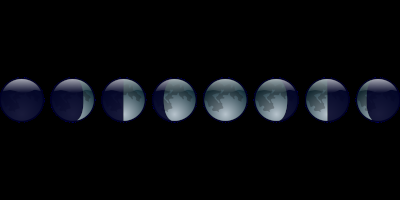
Did you ever look up at the night sky and ask yourself what the moon does and if it is important for our lives? Maybe you did not and I just caught your attention with this random question. Either way, it is quite interesting if you think about it.
Despite the fact that the moon and Earth are approximately 385 000 kilometers apart, the moon has a significant impact on our daily lives. So what actually is the moon’s purpose besides looking pretty or spooky? And what would our lives be like without the moon?
Without the moon, our cycle of the seasons would completely change. The moon stabilizes the earth’s axis. The slope of the earth would change if the moon did not exist. As a consequence, the weather and the seasons would change. On the one hand, without a slope, there would
not be any seasons. On the other hand, with a very strong slope, there would be extreme weather swings.
In addition, the length of a day is influenced by the moon. The ocean tides would be much smaller, allowing the Earth to rotate much faster. As it is now, the tides and all the movement of the water take away some energy and slow down the rotation of the earth. Thus, without the moon, the earth’s rotation would be faster and the days would be much shorter.

Speaking of the oceans and the tides, the tidal movement stabilizes the earth’s climate. Global temperatures could become more extreme without this influence. Also, a whole coastal ecosystem relies on the tides. The churned-up material of the tides is home to many sea creatures, which otherwise would not have a home anymore. Thus, without the moon, many animals would fear extinction.
Furthermore, a missing moon would cause confusion among the animals. The moonlight in the dark of the night makes it possible for predators to hunt in the night. They need this small amount of light to see their prey. Again, the missing moon could be the cause of the extinction of some predators in that context.
As you can see, the moon stabilizes the earth and makes possible the life that we are living right now. It’s no surprise that humanity has wanted to explore the moon since it is the fifth largest moon in the solar system and the Earth’s only natural satellite. Did you know that the moon is the only place in the universe where humans have set foot? The Apollo astronauts brought back a total of 382 kilograms of lunar rocks and soil to Earth to study. I think that is pretty crazy.Lastly, something about the, if you ask me, quite confusing name of the Moon. The Moon is called Moon because, until Galileo Galilei discovered four moons orbiting Jupiter in 1610, no one knew that there were other moons besides the Earth’s moon.
I hope that you learned some new and interesting facts about the Moon. For me, it is really fascinating how a moon that is hundreds of kilometers away from us can influence our planet and thereby our life so much.

Sources:
https://www.focus.de/wissen/natur/meteorologie/wx-academy/die-erde-waere-eine-ganz-andere-welt-duestere-aussichten-so-waere-unser-leben-gaebe-es-keinen-mond_id_115548147.html (Focus, 28.09.2022)
https://www.swr.de/wissen/1000-antworten/was-wuerde-passieren-wenn-der-mond-weg-waere-100.html (Gábor Paál, 28.09.2022)
https://www.rmg.co.uk/stories/topics/what-would-happen-if-moon-disappeared (rmg, 28.09.2022)
https://solarsystem.nasa.gov/moons/earths-moon/overview/ (NASA, 28.09.2022)

